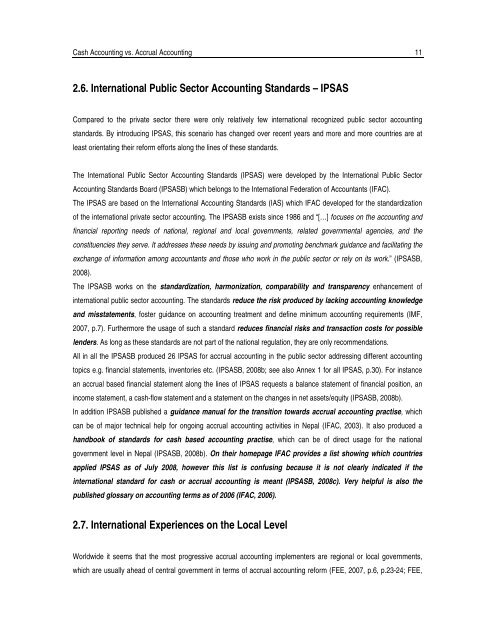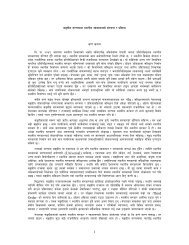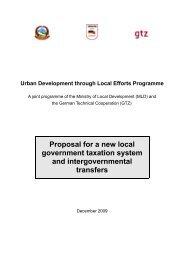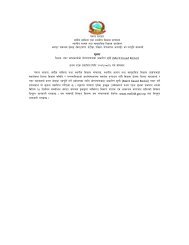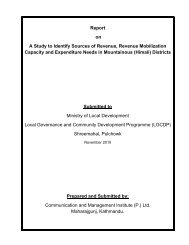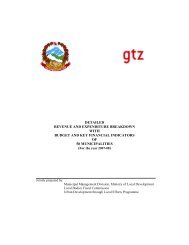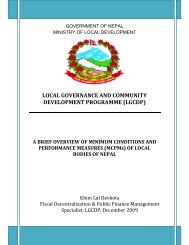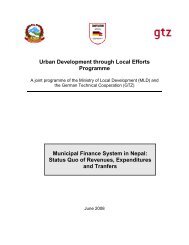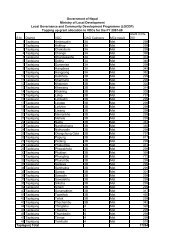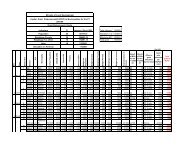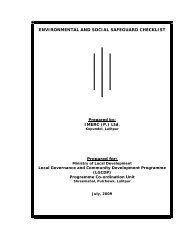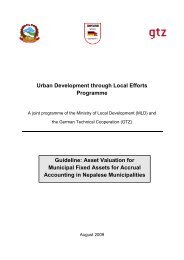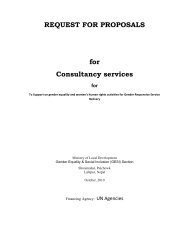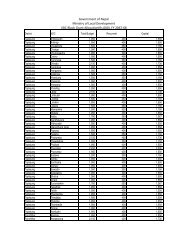GTZ Report on Accrual Accounting Status Quo - LGCDP
GTZ Report on Accrual Accounting Status Quo - LGCDP
GTZ Report on Accrual Accounting Status Quo - LGCDP
You also want an ePaper? Increase the reach of your titles
YUMPU automatically turns print PDFs into web optimized ePapers that Google loves.
Cash <strong>Accounting</strong> vs. <strong>Accrual</strong> <strong>Accounting</strong> 11<br />
2.6. Internati<strong>on</strong>al Public Sector <strong>Accounting</strong> Standards – IPSAS<br />
Compared to the private sector there were <strong>on</strong>ly relatively few internati<strong>on</strong>al recognized public sector accounting<br />
standards. By introducing IPSAS, this scenario has changed over recent years and more and more countries are at<br />
least orientating their reform efforts al<strong>on</strong>g the lines of these standards.<br />
The Internati<strong>on</strong>al Public Sector <strong>Accounting</strong> Standards (IPSAS) were developed by the Internati<strong>on</strong>al Public Sector<br />
<strong>Accounting</strong> Standards Board (IPSASB) which bel<strong>on</strong>gs to the Internati<strong>on</strong>al Federati<strong>on</strong> of Accountants (IFAC).<br />
The IPSAS are based <strong>on</strong> the Internati<strong>on</strong>al <strong>Accounting</strong> Standards (IAS) which IFAC developed for the standardizati<strong>on</strong><br />
of the internati<strong>on</strong>al private sector accounting. The IPSASB exists since 1986 and “[…] focuses <strong>on</strong> the accounting and<br />
financial reporting needs of nati<strong>on</strong>al, regi<strong>on</strong>al and local governments, related governmental agencies, and the<br />
c<strong>on</strong>stituencies they serve. It addresses these needs by issuing and promoting benchmark guidance and facilitating the<br />
exchange of informati<strong>on</strong> am<strong>on</strong>g accountants and those who work in the public sector or rely <strong>on</strong> its work.” (IPSASB,<br />
2008).<br />
The IPSASB works <strong>on</strong> the standardizati<strong>on</strong>, harm<strong>on</strong>izati<strong>on</strong>, comparability and transparency enhancement of<br />
internati<strong>on</strong>al public sector accounting. The standards reduce the risk produced by lacking accounting knowledge<br />
and misstatements, foster guidance <strong>on</strong> accounting treatment and define minimum accounting requirements (IMF,<br />
2007, p.7). Furthermore the usage of such a standard reduces financial risks and transacti<strong>on</strong> costs for possible<br />
lenders. As l<strong>on</strong>g as these standards are not part of the nati<strong>on</strong>al regulati<strong>on</strong>, they are <strong>on</strong>ly recommendati<strong>on</strong>s.<br />
All in all the IPSASB produced 26 IPSAS for accrual accounting in the public sector addressing different accounting<br />
topics e.g. financial statements, inventories etc. (IPSASB, 2008b; see also Annex 1 for all IPSAS, p.30). For instance<br />
an accrual based financial statement al<strong>on</strong>g the lines of IPSAS requests a balance statement of financial positi<strong>on</strong>, an<br />
income statement, a cash-flow statement and a statement <strong>on</strong> the changes in net assets/equity (IPSASB, 2008b).<br />
In additi<strong>on</strong> IPSASB published a guidance manual for the transiti<strong>on</strong> towards accrual accounting practise, which<br />
can be of major technical help for <strong>on</strong>going accrual accounting activities in Nepal (IFAC, 2003). It also produced a<br />
handbook of standards for cash based accounting practise, which can be of direct usage for the nati<strong>on</strong>al<br />
government level in Nepal (IPSASB, 2008b). On their homepage IFAC provides a list showing which countries<br />
applied IPSAS as of July 2008, however this list is c<strong>on</strong>fusing because it is not clearly indicated if the<br />
internati<strong>on</strong>al standard for cash or accrual accounting is meant (IPSASB, 2008c). Very helpful is also the<br />
published glossary <strong>on</strong> accounting terms as of 2006 (IFAC, 2006).<br />
2.7. Internati<strong>on</strong>al Experiences <strong>on</strong> the Local Level<br />
Worldwide it seems that the most progressive accrual accounting implementers are regi<strong>on</strong>al or local governments,<br />
which are usually ahead of central government in terms of accrual accounting reform (FEE, 2007, p.6, p.23-24; FEE,


